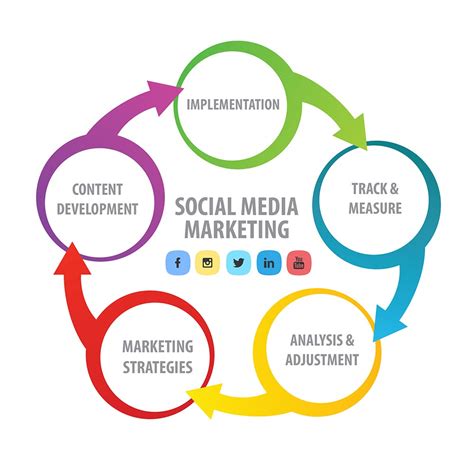Learn key strategies for small business social media marketing in 2024. Understand the landscape, engage your audience, and measure your success.In today’s digital age, social media has become a crucial tool for small businesses to reach and engage with their target audience. As we look ahead to 2024, it’s important for small business owners to stay ahead of the curve and adapt their social media marketing strategies to the ever-changing landscape. In this blog post, we will explore the key components of an effective social media marketing strategy for small businesses in 2024. From understanding the social media landscape and identifying your target audience, to creating engaging content, utilizing influencer partnerships, and measuring and analyzing results, we will provide actionable tips and insights to help you make the most of your social media marketing efforts in the coming year. Whether you’re new to social media marketing or looking to revamp your existing strategy, this post will help you navigate the evolving world of social media and set your small business up for success.
Understanding Social Media Landscape
In today’s digital age, the social media landscape is constantly evolving, with new platforms and trends emerging all the time. As a small business owner, it’s crucial to have a solid understanding of the various social media platforms available and how they can be leveraged for marketing purposes.
Firstly, it’s important to identify the most popular social media platforms, such as Facebook, Instagram, Twitter, and LinkedIn, and understand the unique features and demographics of each platform. This will help you determine which platforms are best suited to reach your target audience and tailor your marketing efforts accordingly.
Furthermore, staying informed about the latest social media trends and updates is essential for small businesses to stay competitive and relevant in the digital space. Whether it’s the rise of video content, the increasing importance of social commerce, or the impact of user-generated content, keeping abreast of these developments will enable small businesses to adapt their social media strategies accordingly.
Finally, a comprehensive understanding of the social media landscape involves analyzing your competitors’ presence on social media, recognizing the key influencers in your industry, and gaining insights from the data and analytics available on these platforms. By studying the behavior and preferences of your target audience, you can create a more effective and engaging social media marketing strategy for your small business.
Identifying Target Audience
Identifying Target Audience
Identifying Target Audience
When it comes to social media marketing for small businesses, one of the most crucial steps is identifying the target audience. Understanding who your audience is and what they are interested in is essential in creating effective marketing strategies. In order to do this, small businesses can utilize several methods to gain insight into their target audience.
One effective method is to conduct market research to identify the specific demographics and psychographics of the target audience. This can involve analyzing data such as age, gender, location, income level, interests, and purchasing behavior. By gaining a deeper understanding of these factors, small businesses can tailor their marketing efforts to better resonate with their audience.
Additionally, businesses can also leverage social media analytics tools to gain insights into their audience’s behavior on various social media platforms. These tools can provide valuable information such as the types of content that resonate with the audience, the best times to post, and which platforms are most popular among the target audience. With this data, small businesses can optimize their social media marketing efforts to better reach their intended audience.
Furthermore, businesses can also engage with their audience directly through surveys, polls, and direct communication. This can provide firsthand insights into the preferences and needs of the target audience, allowing businesses to adjust their marketing strategies accordingly. By actively seeking feedback and engaging with their audience, small businesses can build stronger connections and better understand the needs of their target audience.
Creating Engaging Content
Creating engaging content is essential for small businesses looking to stand out on social media. In a landscape filled with countless posts, stories, and ads, it’s crucial to grab the attention of your target audience and keep them coming back for more. One effective way to do this is by understanding the interests and preferences of your audience. By conducting thorough research and utilizing analytics tools, you can gain valuable insights into what type of content resonates with your followers.
Once you have a clear understanding of your target audience, it’s time to brainstorm and create content that is not only visually appealing but also provides value to your audience. Whether it’s informative blog posts, entertaining videos, or captivating images, the key is to keep your content relevant and authentic. Remember, the goal is to establish a genuine connection with your followers, which can only be achieved through content that speaks to them on a personal level.
Another important aspect of creating engaging content is to incorporate storytelling into your posts. People are naturally drawn to compelling stories, so use this to your advantage by sharing personal anecdotes, customer testimonials, or behind-the-scenes glimpses of your business. This not only humanizes your brand but also encourages engagement and interaction from your audience.
In conclusion, creating engaging content for social media is a strategic process that requires careful planning, creativity, and a deep understanding of your audience. By making use of data-driven insights and harnessing the power of storytelling, small businesses can effectively capture the attention of their target audience and leave a lasting impression through their content.
Utilizing Influencer Partnerships
When it comes to social media marketing strategies for small businesses, utilizing influencer partnerships can be a game-changer. Influencer marketing involves partnering with individuals who have a large following on social media platforms. These individuals, known as influencers, have the power to sway the opinions and purchasing decisions of their followers. By partnering with the right influencers, small businesses can reach a wider audience and gain credibility in their niche.
One effective way to utilize influencer partnerships is by identifying the right influencers for your brand. It’s important to choose influencers whose values align with your brand and who have an engaged and relevant audience. This will ensure that your partnership is authentic and will resonate with the influencer’s followers. Once you have identified potential influencers, it’s important to establish a mutually beneficial partnership. This can involve offering incentives such as free products, discounts, or even monetary compensation in exchange for promotions on the influencer’s social media accounts.
Another important aspect of utilizing influencer partnerships is to track and measure the results of the collaboration. Small businesses can use social media analytics tools to monitor the performance of influencer partnerships. This includes tracking metrics such as engagement, reach, and conversion rates to determine the success of the collaboration. By analyzing these results, businesses can make informed decisions about future influencer partnerships and optimize their social media marketing strategies.
| Benefits of Influencer Partnerships | – Increased brand awareness | – Access to new audiences |
|---|---|---|
| Effective for niche marketing | – Authentic promotion | – Enhanced credibility |
Measuring and Analyzing Results
When it comes to social media marketing, it’s essential for small businesses to have a clear understanding of how to measure and analyze their results. This involves tracking key metrics such as engagement, reach, and conversions to determine the effectiveness of their social media campaigns. By using analytics tools provided by platforms such as Facebook, Instagram, and Twitter, businesses can gain valuable insights into the performance of their posts and ads.
One important aspect of measuring results is setting specific goals and KPIs (Key Performance Indicators) for each social media campaign. Whether the objective is to increase brand awareness, drive website traffic, or generate leads, having measurable goals in place allows businesses to assess the success of their marketing efforts. For example, if the goal is to increase engagement, businesses can track metrics such as likes, comments, and shares to see if their content is resonating with their audience.
Another crucial component of analyzing results is understanding the demographics and behavior of the audience. This includes identifying the age, gender, location, and interests of the social media followers and customers. By leveraging this data, businesses can tailor their content and targeting strategies to better connect with their target audience. For instance, if the majority of the audience is located in a specific region, businesses can customize their posts to appeal to local interests and preferences.
Furthermore, small businesses can utilize the power of A/B testing to evaluate the performance of different ad creatives, copy, and targeting options. By testing variations of their content and advertisements, businesses can determine which elements are driving the best results and optimize their future campaigns accordingly. By continuously analyzing the data and making informed adjustments, small businesses can refine their social media marketing strategies and achieve better outcomes.
Frequently Asked Questions
Why is social media marketing important for small businesses?
Social media marketing allows small businesses to reach a wider audience, engage with customers, and build brand awareness at a lower cost compared to traditional marketing methods.
What are some effective social media marketing strategies for small businesses in 2024?
Some effective strategies include creating engaging content, using video marketing, collaborating with influencers, and leveraging social commerce. It’s also essential to focus on customer service and community building.
How can small businesses use social media advertising to their advantage?
Small businesses can use targeted social media advertising to reach specific demographics, retarget website visitors, and generate leads or sales. It’s important to track and analyze the results to optimize ad performance.
What role does storytelling play in social media marketing for small businesses?
Storytelling can help small businesses connect with their audience on a personal level, showcase their brand’s values, and differentiate themselves from competitors. It creates an emotional connection and fosters brand loyalty.
How important is it for small businesses to stay updated with social media trends?
Staying updated with social media trends is crucial for small businesses to remain relevant, adapt to changes in consumer behavior, and take advantage of new features and opportunities offered by social platforms.
What are the common mistakes small businesses should avoid in social media marketing?
Common mistakes include inconsistent posting, lack of engagement with followers, ignoring negative comments, and solely focusing on sales promotions. It’s important to maintain authenticity and provide value to the audience.
What are the key metrics small businesses should track to measure social media marketing performance?
Key metrics include reach, engagement, conversion rates, click-through rates, and return on investment (ROI). Small businesses should also monitor sentiment and brand mentions to gauge audience feedback.



